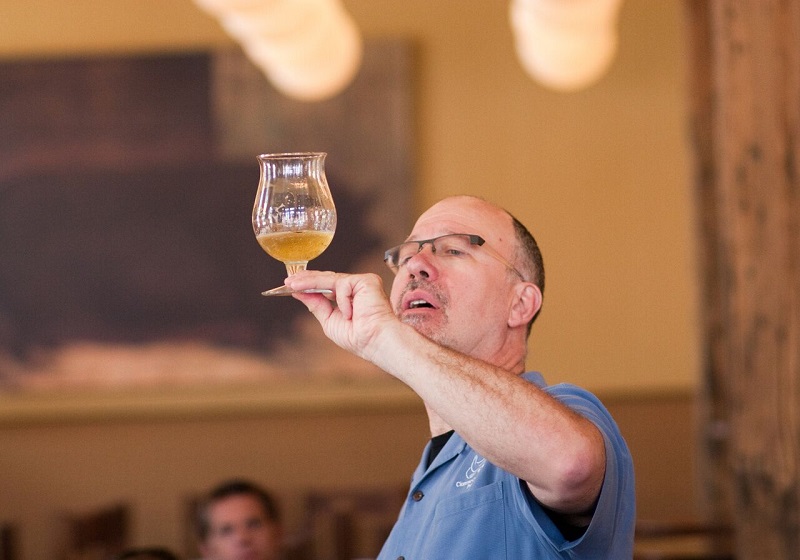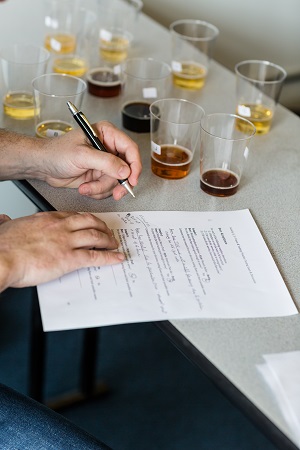Three Beer Experts Walk Into a Bar: The Origins of the Cicerone Certification Program

(Photo by Johnny Knight)
On a July evening in 2006, Ray Daniels, Lyn Kruger and Randy Mosher stopped in at a basement bar in Durango, Colorado, well-known for its beer selection. The trio were in town to teach an advanced homebrewing course through Durango’s Fort Lewis College and the Siebel Institute, the esteemed Chicago-based brewing school where Kruger was president and chief operating officer and Daniels and Mosher regular lecturers.
They ordered that reliably delicious go-to, Sierra Nevada Pale Ale.
Their beers arrived looking cloudy. Worse, they tasted buttery and sour. Daniels, Kruger and Mosher knew right away that these particular servings of the Sierra Nevada flagship were off. The beers should have been clear and effervescent, with a citrusy hoppiness and a crisp finish.
Something was awry—and very likely not because of the brewery 1,000 miles away in Northern California. The three alerted the waitress to the possibility that the bar’s draft lines needed cleaning.
“No,” she told them, “this was how the beer always looks and tastes.”
The trio of experts begged to differ.
“I’m sorry,” the waitress said. “There’s nothing I can do.”
Daniels, Kruger and Mosher asked to speak with the manager; the manager never showed; the three paid their bill, did not tip and left the bar.
For Daniels in particular, the experience 10 years ago next month was the last straw. He decided to put into action an idea that had been batting around his brain for a while: a training program for everyone standing between a brewery and its consumers.
It would be similar to the wine-training programs that had been turning out phalanxes of sommeliers in the U.S. since at least the 1970s, and would differ from the Beer Judge Certification Program that homebrewing enthusiasts and the American Homebrewers Association launched in 1985. Those exams, focused on styles and the science behind brewing, targeted people who wanted to judge competitions.

(Photo by Adam Blaszkiewicz)
Daniels would gear his idea toward service workers such as the one in that basement bar in Durango, training people in industries such as hospitality and restaurants not only on styles and brewing, but especially on how to store, serve and talk to consumers about beer. He would sell beer expertise, which seemed at times in woefully short supply.
Daniels was in a position to do it, too. He had studied biochemistry at Texas A&M and earned an MBA from Harvard. Daniels worked in the pharmaceutical industry before a beery epiphany over a Samuel Adams Boston Lager during a business trip to Washington, D.C., in the late 1980s.
He was soon geeking out to beer. He wrote a well-received book on recipe formulation in the mid-1990s and went to work for the precursor to the Brewers Association trade group (as well as lectured at Siebel).
In the summer of 2007, Daniels, working out of his Chicago home, where a stainless-steel kegerator sat in the living room, devised a syllabus for what he was calling the Cicerone Certification Program (the first word could be translated from Italian as “guide”).
While there would eventually be more intensive, higher-level certifications called “Certified Cicerone,” “Advanced Cicerone” and “Master Cicerone,” Daniels started modestly. On Jan. 3, 2008, he administered the first exam in the program, to become a “Certified Beer Server,” over the web to a little more than a dozen people paying $49 each.
One of the multiple-choice questions was:
Draft beer lines should be cleaned every 14 days.
-
a) true
-
b) false
Well?
Read more Acitelli on History posts.
Tom Acitelli is the author of The Audacity of Hops: The History of America’s Craft Beer Revolution. His most recent book is a history of American fine wine called American Wine: A Coming-of-Age Story. Reach him on Twitter @tomacitelli.
Editor’s Note: An earlier version of this story incorrectly identified Lyn Kruger as Liz.

Leave a Reply